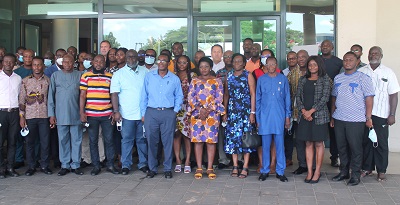
The proportion of the Ghanaian population using improved drinking water and sanitation services has increased between 2015and 2020, the National DevelopmentPlanning Commission (NDPC) has said.
With water, it said, the proportion has gone up from 33 percent to 41 percent at the national level; 11 percent to 16 percent in the rural area and 52 percent to 60 percent in the urban area.
A planning analyst of the NDPC, Ms Patience Ampomah, who disclosed these at a learning exchange event in Accra yesterday, said the section of the population using improved sanitation services swelled from 11 percent to 13 percent.
She was presenting the “Status of Water, Sanitation Hygiene (WASH)and water resources management” in the country with respect to the Sustainable Development Goals (SDGs) goal six on clean water and sanitation.
The SDGs comprising 17 Goals, 169 Targets, 232 indicators were adopted by the United Nations in 2015 as a universal call to action to end poverty, protect the planet, and ensure that by 2030 all people enjoy peace and prosperity.
The event organized by IRC Ghana, a non-governmental organisation in collaboration with NDPC, WaterAid Ghana and Water4, was on theme “Local systems strengthening to deliver safe and sustainable Water Sanitation Hygiene (WASH) services: reflections on the district-wide approach towards meeting the target for SGD-6.”
The learning exchange created the platform for partners and some district assembly representatives implementing district-wide approaches to achieving WASH and WASH-related SDGs to share their experiences and deliberate on how to improve the sector.
MsAmpomahsaid in improving access to safe and reliable water supply services for all, there were on-going projects involving drilling and maintenance of boreholes/mechanized and maintenance of water systems.
The Challenges, she said, were percentage of distribution losses of 50.52 for 2019 and2020; regulating and managing self-supply and other suppliers of drinking water; water quality testing and non-functional water and Sanitation Management Teams in some communities.
Touching on the proportion of population using safely managed sanitation services, 2015, 2017 and 2020, she said self-managed facilities had increased from 11 to 13 percent; unimproved facilities had decreased from 13 to 11 while open defection of 19 percent went down by one percent.
She said despite several projects ongoing, indiscriminate dumping, open defecation, lack of WASH facilities in some schools and water pollution, remained challenges in the sector.
Ms Ampomah said some efforts outlined to make progress included Intensifying collaboration with partners to achieve targets for SDG 6, Sharing good practices and improving WASH planning and implementation.
The Country Director of IRC Ghana, Vida Duti, said her organisation would continue to support efforts to improve WASH and called on other stakeholders to do same to help achieve the SDG-6.
BY JONATHAN DONKOR







